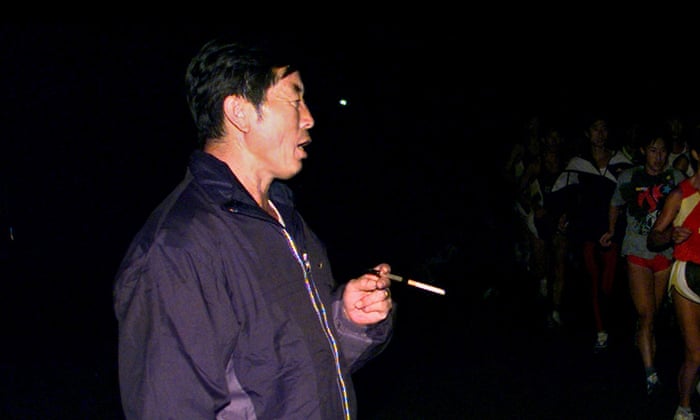China's systematic doping in all sports: More than 10,000 athletes were affected, says former China Olympic doctor
By Sean Ingle
By Sean Ingle

The controversial China track coach Ma Junren monitoring training on the Tibetan plateau in 2000.
A former doctor for the Chinese Olympic team has revealed that more than 10,000 of the country’s athletes were involved in a systematic doping programme across all sports – and that every one of China’s medals in major tournaments in the 1980s and 90s came from performance‑enhancing drugs.
Xue Yinxian, a 79-year-old Chinese whistleblower who is seeking political asylum in Germany, also claimed that athletes aged as young as 11 were introduced to the compulsory doping scheme – which existed in football, athletics, swimming, volleyball, basketball, table tennis, diving, gymnastics and weightlifting – and that anyone who spoke against the system now sits in jail.
“In the 1980s and 90s, Chinese athletes on the national teams made extensive use of doping substances,” Xue told the German broadcaster ARD.
“Medals were tainted by doping – gold, silver and bronze. There must have been more than 10,000 people involved. People believed only in doping, anyone who took doping substances was seen to be defending the country. All international medals [won by Chinese athletes in that time] should be taken back.”
However, there is no chance of medals being retrospectively stripped because the statute of limitations has long passed.
Xue worked as a doctor with several national Chinese teams from the 1970s, but fled from China with her son after first speaking out against doping in 2012 and says she no longer felt safe in her home city, Beijing.
She claimed she first became aware of the problem when a coach came to her concerned about the physical changes in male athletes, aged between 13 and 14, due to substances handed out by officials.
“At first, the youth-age group teams used the substances – the youngest were 11 years old,” she said. “If you refused to dope, you had to leave the team. I couldn’t do anything about it.”
She said she was dismissed from working with the national team for refusing to treat a gymnast with a banned substance at the 1988 Olympic Games in Seoul, but kept working in lower-level Chinese sport.
“Anyone against doping damaged the country and anyone who endangered the country now sits in prison,” she told ARD.
“At first, the youth-age group teams used the substances – the youngest were 11 years old,” she said. “If you refused to dope, you had to leave the team. I couldn’t do anything about it.”
She said she was dismissed from working with the national team for refusing to treat a gymnast with a banned substance at the 1988 Olympic Games in Seoul, but kept working in lower-level Chinese sport.
“Anyone against doping damaged the country and anyone who endangered the country now sits in prison,” she told ARD.
“They warned me against talking about doping substances. They urged me to back down. I said I couldn’t do that. They wanted to silence me … both of my sons lost their jobs.”
Athletes were repeatedly tested until they came back negative – and were then sent to international competitions.
Athletes were repeatedly tested until they came back negative – and were then sent to international competitions.
The call sign “Grandma is home” was applied to those athletes, she said, who no longer had traces of doping substances in their body.
ARD reporters tried to contact the Chinese Olympic Committee and China’s sports ministry for a response to the claims, but never received a reply, according to the broadcaster.
ARD reporters tried to contact the Chinese Olympic Committee and China’s sports ministry for a response to the claims, but never received a reply, according to the broadcaster.
China has long been linked with accusations of doping – although never before on this scale.
In February athletes linked to the controversial track coach Ma Junren, whose athletes broke 66 national and world records, said they had been forced to take performance-enhancing drugs.
In a letter published by Tencent Sports they wrote: “We are humans, not animals. For many years, [we were] forced to take a large dose of illegal drugs – it was true.”
In a letter published by Tencent Sports they wrote: “We are humans, not animals. For many years, [we were] forced to take a large dose of illegal drugs – it was true.”
Aucun commentaire:
Enregistrer un commentaire